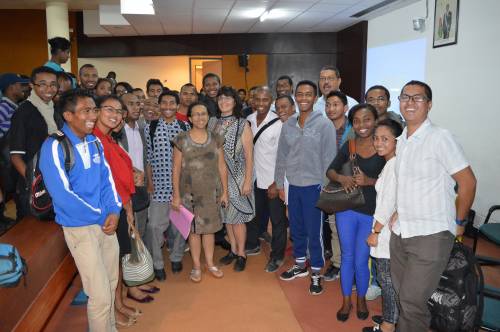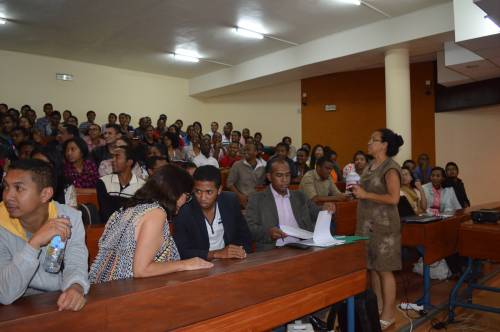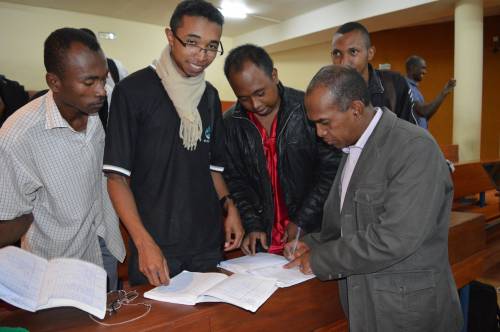A letter from Martha Sommers temporarily in Madagascar from serving in the Democratic Republic of the Congo
May 2017
Write to Martha Sommers
Individuals: Give online to E200526 for Martha Sommers’ sending and support
Congregations: Give to D507157 for Martha Sommers’ sending and support
Churches are asked to send donations through your congregation’s normal receiving site (this is usually your presbytery).
Dear Family and Friends,
If you find yourself temporarily in Madagascar, how best to utilize your time? Well, when I was introduced to Dr. Samison Luc Heré, the president of Universite D’Antanarivo Faculte de Medecine, he partially answered that question for me.
Having heard my specialty was family medicine, he told me that family medicine does not exist yet as a specialty in Madagascar, yet the Faculte de Medecine, which is the only medical college in Madagascar, is planning to develop a family medicine academic department. Next, looking at me, he said, “You should do a conference introducing family medicine.” He turned to Dr. Olivat Rakoto Alson, the chairperson of human medicine, and said, “You two should work together on this.”
Family medicine is the specialty that encompasses all ages, treating the patient and community, not the disease. The postgraduate programs in Africa are three- or four-year programs after medical school, and these programs are part of university family medicine departments that are also involved in training medical students and in research. Countries that base their health systems on these highly trained generalists are able to bring quality healthcare closer to underserved communities and move toward universal access and equitable care. The specific roles for family physicians depend on where they work.
Madagascar is a huge island where the vast majority of people live in rural communities that dot the landscape. The healthcare these people receive comes through uncoordinated public health programs, and rural health centers and hospitals. If they are lucky, their hospital or health center is staffed by a doctor whose training ended with medical school. Many health centers are without doctors. Most of the doctors leave these areas to train in specialties that divide medicine, such as pediatrics and gynecology, or further divide medicine into subspecialties. The graduates of these programs mainly stay to practice their specialty in the capital city, which is oversaturated with doctors. Meanwhile, rural communities continue with minimal, uncoordinated care.
The current leaders of Madagascar’s Ministry of Health and Faculte de Medecine have begun to discuss how to develop family medicine departments and positions in their healthcare system to improve Madagascar’s health. Hopefully, conferences introducing family medicine assist in widening the participation in these discussions.
Within a week, I met Dr. Olivat at her office. She is the cheerful wearer of many hats. Besides her role as chairperson of the Department of Human Medicine at the country’s only medical school, she is director of the Hospital Joseph Ravoahangy Andrianavalina government hospital, sees patients as a practicing hematologist and teaches medical students and residents. There is always a line of people waiting to see her at her office, or stopping her in the hallway. Yet, when I meet her in her office, she is able to focus completely on our discussion. Dr. Olivat suggested that we should have separate conferences, the first one for medical students, and the second for faculty and practicing doctors. I was to be in charge of the content and presenters. She took care of logistics. We met a few times in person and spoke on the phone before the actual conference.
Now let me take you to the day of the conference for medical students. All of the seats are full, and students continue to come, sitting on the floor in the side aisles. After Dr. Olivat does introductions, I am the first to present, sharing the principles of family medicine and how its development has improved healthcare in the various countries in which I have worked. At first, the students are slow to respond to questions, yet quickly participation grows. Affirmative responses to rhetorical questions—such as “Who wants to be trained to best serve in rural Madagascar?”—are deafening. Dr. Fernand René Olivier, the medical coordinator of Fiana Be Dia Be, a charity that organizes surgical missions to communities in Madagascar that sometimes cannot be reached by road, explains how he thinks family medicine’s development will help Madagascar.
After him, Dr. Randrianonivelo Josoa, coordinator of the health program of the PC(USA)’s partner church, the Church of Jesus Christ of Madagascar, describes efforts going on now to further prepare doctors and help them stay in rural areas. Both he and Dr. Olivier mix humor with seriousness, describing being paid in fish, becoming part of communities and being heartbroken when you know additional training would have helped you to save the lives of your friends. Responding to a question about security, Dr. Josoa tells the following story: One doctor at a dispensary had to walk 70 kilometers to collect his box of medicines and supplies. On the way back, still some kilometers from the village he was serving, he took shelter in a shack for the night. When he woke up, the box of supplies was gone, and he sadly walked the rest of the way home. When he arrived, he found the box of medicines and supplies waiting for him. The thieves were able to read and decided to serve as porters for the doctor. In many villages, even thieves will assist doctors. The stories and discussions continue through and long past the refreshments afterwards.
Now we are working on details for the June 7 Introduction to Family Medicine conference for faculty and practicing doctors. Your generosity makes these opportunities possible. Please continue to donate as we work to fulfill John 10:10, “I came that they may have life, and have it abundantly.”
I will be back in the US in time for PC(USA)’s Big Tent 2017 in Saint Louis in July, and will then talk at churches. Hopefully, I will be able to see many of you.
With gratitude,
Martha
![]() You may freely reuse and distribute this article in its entirety for non-commercial purposes in any medium. Please include author attribution, photography credits, and a link to the original article. This work is licensed under a Creative Commons Attribution-NonCommercial-NoDeratives 4.0 International License.
You may freely reuse and distribute this article in its entirety for non-commercial purposes in any medium. Please include author attribution, photography credits, and a link to the original article. This work is licensed under a Creative Commons Attribution-NonCommercial-NoDeratives 4.0 International License.


